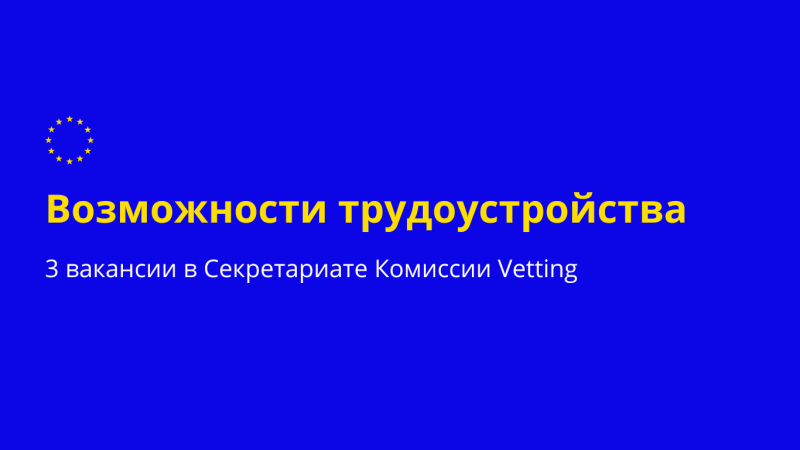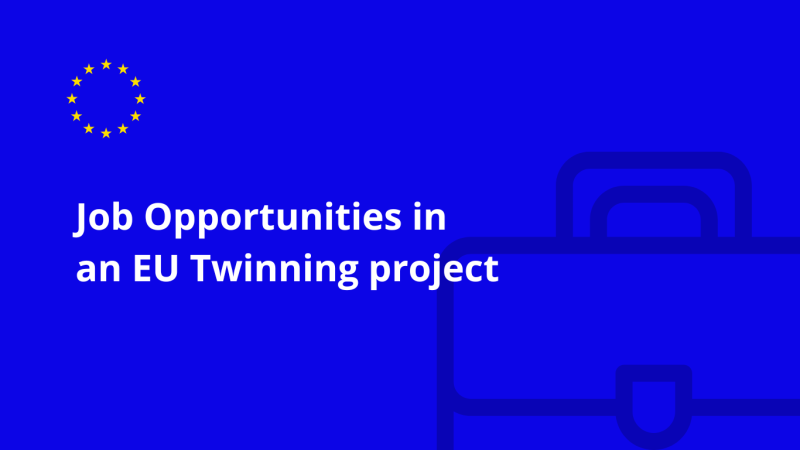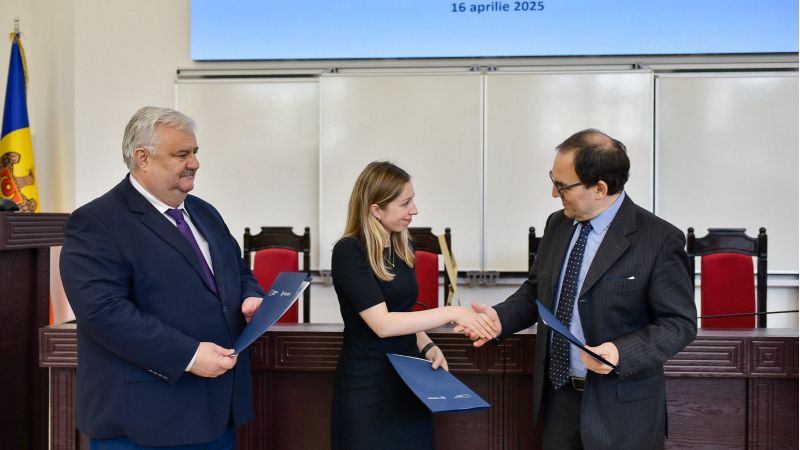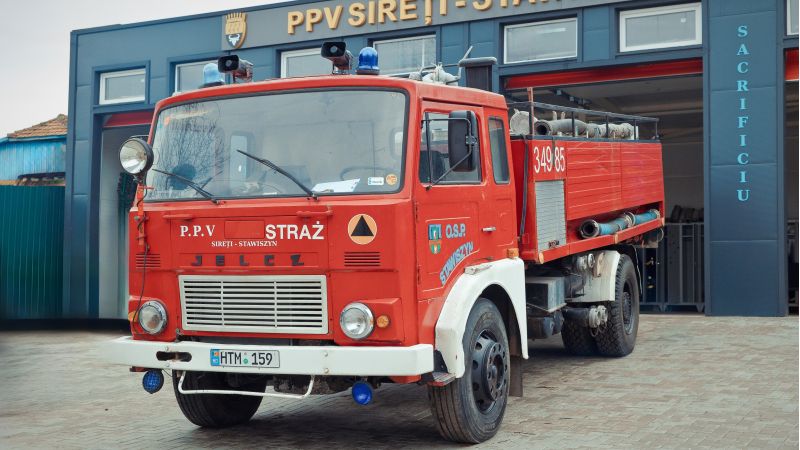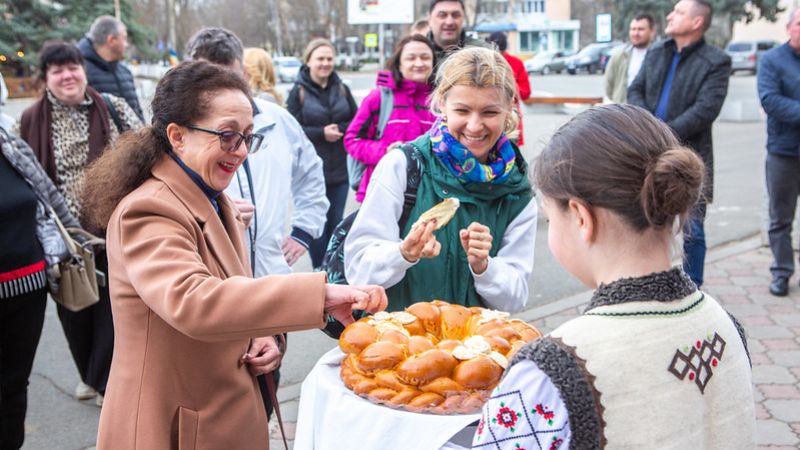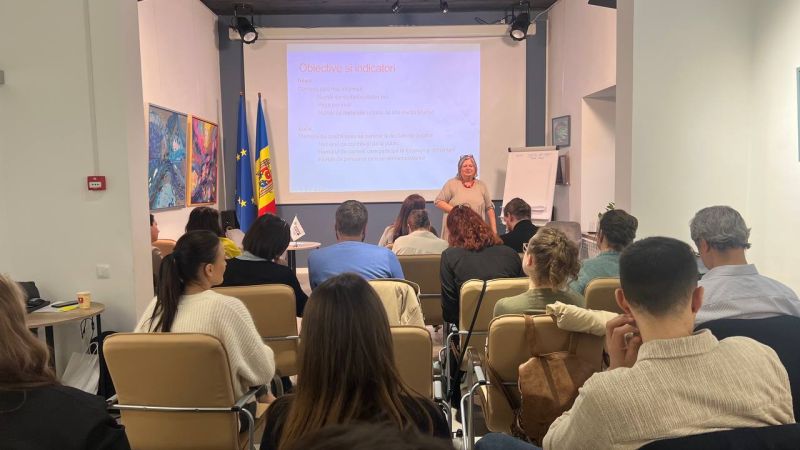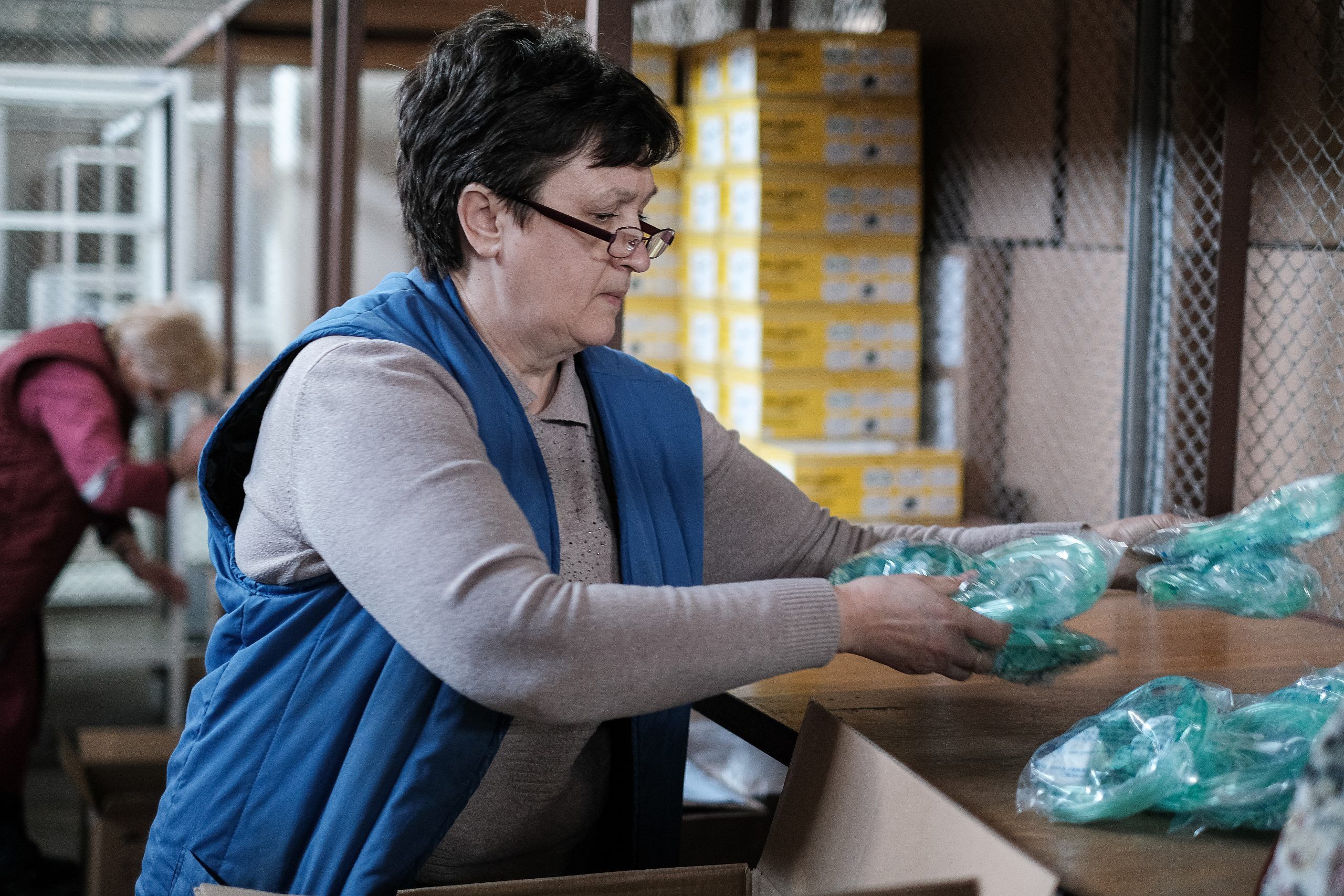
Today they help us, tomorrow we help others. Solidarity as a response to the pandemic
- Cross-cutting areas
- Civil society
- Mobility & people-to-people contacts
- Education and vocational training
- Health
Thanks to the Solidarity for Health initiative, which is funded by the European Union and implemented by the WHO, Belarus has received significant assistance to fight COVID-19.


Millions of masks, respirators, shields and gloves, a ventilator, special equipment for laboratories, hundreds of trained specialists — these are the results of the Solidarity for Health Initiative, which is funded by the European Union and implemented by the WHO. For Belarus, the amount of assistance is $5.3 million.
‘I have never seen such international solidarity in healthcare’
Eduard Valchuk, the chief doctor of the National Centre for the Organisation of Medical Response, shows the Belmedtechnika warehouse, where humanitarian supplies are delivered within the framework of the EU-WHO Solidarity for Health project: “Here the humanitarian aid we receive is stored and distributed as intended. I have never seen such international solidarity in healthcare as it is now. It is impressive.”
Even the smallest assistance is significant for the Belarusian health care, the chief doctor of the centre noted: “One mask will go to one person, who will be protected from the virus. The humanitarian aid that comes through the Solidarity for Health project is significant on a national scale — it protects doctors and helps patients.”
Valchuk believes that the pandemic has brought together doctors who work as one living organism to fight COVID-19 and help patients. This, of course, does not mean that it is easy for them:
“Round-the-clock mode, red zones, which the medical worker cannot exit until the end of the shift. This made the job extremely difficult. In hospitals, there are seriously ill patients, there are a lot of them. Since the beginning of the pandemic, health organisers, specialists of regional and city-level health departments, and the Ministry of Health have been working almost seven days a week. The situation is constantly monitored. If there is somewhere that needs certain medicines, protective equipment, we respond.”
To help doctors, we all need to wear masks and keep distance, says the doctor, who himself had COVID-19 earlier in the pandemic:
“Sometimes you hear, well, what’s a mask, what’s the point of it? If masks are worn by everyone they will work, this is protection. If a person is protected, it means that he or she avoids the virus. And this is a huge support for our healthcare. When we talk about international support, today we hope that soon we will not need help, that we will be able to help others. We have high hopes for vaccination.”


The EU will also assist in protecting the population of Belarus from COVID-19 within the framework of the project “European Union-WHO action to support deployment of COVID-19 vaccines and vaccination in Eastern Partnership countries, 2021-2023”. The project aims at providing Belarus with technical assistance in implementing vaccination against COVID-19.
The budget for the first phase of the project, which will last until June 2021, is about €400,000. These funds are used to purchase special freezing equipment for transporting and storing vaccines, as well as monitoring the cold chain compliance. Also, medical workers will be trained within the framework of the initiative.
‘The laboratory diagnostics service has never experienced anything similar before’
So far, one still has to rely on social distancing, wearing masks and timely detection of coronavirus infections.
There are 60 laboratories in Belarus that can perform PCR tests for COVID-19, said Natallia Kaliadka, deputy chief external expert of the Ministry of Health for laboratory diagnostics, who works as head of the department at RUE ‘Belmedpreparaty’.
Currently, Belarus uses locally made PCR test systems, which are produced by four Belarusian manufacturers: “Our manufacturers are just heroes — they quickly created test systems for PCR and promptly tackled the problems that arose.”
For specialists of laboratory diagnostics, Kaliadka noted, the pandemic became a special period, the service had never experienced anything like this before:
“People worked with a very heavy load. Contacts between different laboratories expanded, specialists began to communicate more with each other, mastering new testing methods. People rallied and got positive results being one team.”


In such conditions, the importance of international support cannot be overestimated. During the pandemic, cooperation in the field of laboratory diagnostics began with training webinars on biosafety within the framework of the EU-WHO Solidarity for Health project, Natallia Kaliadka said:
“Now there is a lot of information about the detection of COVID-19, on the one hand, and on the other, it is disparate. Finding something that will work well in practice takes time. Doctors from different regions of Belarus, who are engaged in laboratory diagnostics, received important information from leading Belarusian specialists at webinars.”
Recently, several automated RNA/DNA isolation systems have been purchased as part of the joint EU-WHO project: “This facilitates, accelerates the work of laboratories, minimises the human factor, improves the quality, and increases the volume of tests. In addition, WHO has helped us with the purchase of amplifiers needed for the second stage of the polymerase chain reaction. Belarus will receive several such devices.”
Also, within the framework of the Solidarity for Health project, the laboratory service of Belarus was provided with rapid tests to detect antigens that are used in the diagnosis of COVID-19 and in some cases can replace PCRs. Moreover, this rapid analysis (testing takes up to half an hour) is well comparable to PCR.
“We plan,” said Natallia Kaliadka, “that antigen detection tests will be used in some remote areas in urgent situations, for example, in emergency hospitalization.”
There are also plans to conduct external quality control of PCR tests. In practice, it looks like this: biological material is sent to a Belarusian laboratory where it is tested for COVID-19 using a PCR test. Then the results are sent to a specific authorised organisation that will determine whether the test was conducted correctly.
This international control allows a laboratory to obtain an appropriate certificate, which shows testing is at a high level:
“External quality control by an independent organisation should be regular, this is a global practice. For the laboratory, this is an addition to internal control, a matter not only of prestige, but also of confidence that the testing is of high quality.”


Finally, another joint EU-WHO project is discussing the purchase of high-tech equipment for the RSPC of Epidemiology and Microbiology to study the virus genome.
“We are ready for cooperation, it contributes to better epidemiological situation in the country and the region,” Natalia Kaliadka concluded.
‘To take care of everyone’
In general, within the framework of the EU Solidarity for Health project, funds for Belarus are spent on procurement, education and research activities.
In an interview with Naviny.By, Masoud Dara, Special Representative of the WHO Regional Director in Belarus/Head of the WHO Country Office in Belarus, said that $3.8 million have already been spent on the purchase of personal protective equipment and appliances. A total of 2.4 million medical masks, 1 million respirators, 85,000 insulating coats, 50,000 protective glasses, 51,000 face shields, 1.282 million medical gloves, and a ventilator have been purchased and delivered to medical institutions across the country.
In the near future, 160 devices for high-flow nasal oxygen therapy, 20,000 express tests for the diagnosis of SARS-CoV-2 Ag-RDTs, and 5,482 oxygen masks with a tank will be distributed among medical institutions — for a total of $850,000.
Doctors have also been trained in intensive care for patients with COVID-19, and specialists from more than 150 national laboratories attended webinars on biosafety and features of COVID-19 diagnostics.
The first course of training for general practitioners and psychiatrists from all over Belarus under the programme “Diagnosis and treatment of mental and behavioural disorders in the context of the COVID-19 epidemic” was held at the RNPC of Mental Health. In total, 13 such courses are planned with 78 participants trained.
Two studies are being conducted in Belarus within the framework of the Solidarity for Health initiative — the spread of COVID-19 (still in progress) and the population’s behaviour (already completed, the results are being analysed).


In the course of the behaviour study, experts want to get an idea of how people perceive coronavirus infection risks, their awareness, and reliable sources of information. A similar study is conducted in about 30 countries. Currently, it is also taking place in Georgia and Moldova within the same project.
“This will help develop an effective response to the COVID-19 outbreak, including management decisions and communications,” Dara said.
He stressed that the EU Solidarity for Health initiative had helped the WHO to provide the necessary equipment in a timely manner and support Belarus during the pandemic.
“Solidarity, as the name of the project indicates, is at the heart of comprehensive and integrated support in response to the pandemic, it unites all of us as human beings to take care of everyone,” Masoud Dara said.
The Solidarity for Health initiative is funded by the European Union in six countries of the Eastern Partnership: Armenia, Azerbaijan, Belarus, Georgia, Moldova and Ukraine. The initiative aims to provide an effective, rapid, and coordinated response to COVID-19, and strengthen the national capacity to effectively prevent, prepare for, detect and respond to public health emergencies.
The project lasts for two years: from March 27, 2020 to March 26, 2022. The total amount of funding for Belarus is $5.3 million.
Author: Elena Spasyuk
Article published in Russian by Naviny.by
